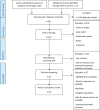The association between migraine and breast cancer risk: A systematic review and meta-analysis
- PMID: 35143585
- PMCID: PMC8830615
- DOI: 10.1371/journal.pone.0263628
The association between migraine and breast cancer risk: A systematic review and meta-analysis
Abstract
Background: Migraines is likely to play a protective role in the risk of breast cancer. Some studies have shown that there is an inverse relationship between migraine and breast cancer, and some studies have not found an association; therefore, results from previous studies have been inconclusive and we conducted a meta-analysis to evaluate association between migraine and breast cancer.
Methods: PubMed, EMBASE, Scopus and Web of Science were searched to identify studies on the association between migraine and breast cancer from January 1, 2000 through March 12, 2021. The pooled relative risk (RR) and the 95% confidence intervals (CI) was used to measure this relationship by assuming a random effects meta-analytic model.
Results: A total of 10 studies were included. Our study revealed that there was statistically significant inverse relationship between migraine and breast cancer in case-control studies 0.68 [95% CI: 0.56, 0.82], but no significant relationship was found in cohort studies 0.98 [95% CI: 0.91, 1.06]. Also, migraine reduced the risk of ductal carcinoma 0.84 [95% CI: 0.73, 0.96], and lobular carcinoma 0.83 [95% CI: 0.73, 0.96]. With respect to ER_PR status no association between migraine and breast cancer was found. We found no evidence of publication bias.
Conclusion: Our analysis demonstrated a statistically significantly inverse relationship between migraine and total risk of breast cancer only in case-control studies. In summary, cohort studies do not support an inverse association between migraine and incident breast cancer. While in case-control studies, migraine has an inverse association with ductal carcinoma and lobular carcinoma of breast.
Conflict of interest statement
The authors have declared that no competing interests exist.
Figures





Similar articles
-
Migraine and breast cancer risk: a meta-analysis of observational studies based on MOOSE compliant.Medicine (Baltimore). 2016 Jul;95(30):e4031. doi: 10.1097/MD.0000000000004031. Medicine (Baltimore). 2016. PMID: 27472675 Free PMC article. Review.
-
Migraine in postmenopausal women and the risk of invasive breast cancer.Cancer Epidemiol Biomarkers Prev. 2008 Nov;17(11):3116-22. doi: 10.1158/1055-9965.EPI-08-0527. Cancer Epidemiol Biomarkers Prev. 2008. PMID: 18990752 Free PMC article.
-
The risk of breast cancer associated with specific patterns of migraine history.Cancer Causes Control. 2014 Dec;25(12):1707-15. doi: 10.1007/s10552-014-0479-y. Epub 2014 Oct 31. Cancer Causes Control. 2014. PMID: 25359301 Free PMC article.
-
Dietary Patterns and Risk of Invasive Ductal and Lobular Breast Carcinomas: A Systematic Review and Meta-analysis.Clin Breast Cancer. 2020 Aug;20(4):e516-e528. doi: 10.1016/j.clbc.2020.03.007. Epub 2020 Mar 28. Clin Breast Cancer. 2020. PMID: 32362500
-
Relationship between migraine history and breast cancer risk among premenopausal and postmenopausal women.Cancer Epidemiol Biomarkers Prev. 2009 Jul;18(7):2030-4. doi: 10.1158/1055-9965.EPI-09-0291. Cancer Epidemiol Biomarkers Prev. 2009. PMID: 19589913 Free PMC article.
Cited by
-
AI-Guided Cancer Therapy for Patients with Coexisting Migraines.Cancers (Basel). 2024 Oct 31;16(21):3690. doi: 10.3390/cancers16213690. Cancers (Basel). 2024. PMID: 39518129 Free PMC article. Review.
-
Profiling the Spectrum of Headache Disorders on 440 Breast Cancer Patients: Highlights on Clinical and Pathological Mechanisms.Biomedicines. 2023 Mar 30;11(4):1059. doi: 10.3390/biomedicines11041059. Biomedicines. 2023. PMID: 37189678 Free PMC article.
-
Commentary: Improvement in diagnostic-therapeutic care pathways for women with migraine: an Italian Delphi panel.Front Neurol. 2024 Nov 20;15:1507261. doi: 10.3389/fneur.2024.1507261. eCollection 2024. Front Neurol. 2024. PMID: 39634775 Free PMC article. No abstract available.
-
The Role of Female Reproductive Hormones in the Association between Migraine and Breast Cancer: An Unanswered Question.Biomedicines. 2023 Jun 1;11(6):1613. doi: 10.3390/biomedicines11061613. Biomedicines. 2023. PMID: 37371707 Free PMC article. Review.
-
Imaging Correlates between Headache and Breast Cancer: An [18F]FDG PET Study.Cancers (Basel). 2023 Aug 17;15(16):4147. doi: 10.3390/cancers15164147. Cancers (Basel). 2023. PMID: 37627174 Free PMC article.
References
-
- Breast cancer. 2021; Available from: https://www.who.int/news-room/fact-sheets/detail/breast-cancer.
-
- Althuis M.D., et al.., Etiology of hormone receptor–defined breast cancer: a systematic review of the literature. Cancer Epidemiology and Prevention Biomarkers, 2004. 13(10): p. 1558–1568. - PubMed
Publication types
MeSH terms
LinkOut - more resources
Full Text Sources
Medical
Research Materials

